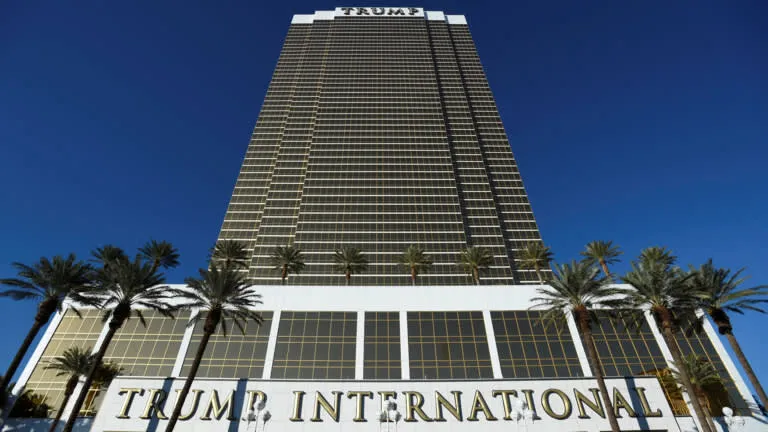
Even with the U.S. likely still weeks away from its coronavirus peak, President Donald Trump has set a timeline for easing its partial lockdown, saying Tuesday that he wants Americans back at work by mid-April.
"We're going to be opening relatively soon," Trump said at a virtual town hall held on the White House lawn with Fox News.
"I would love to have the country opened up and just raring to go by Easter," he said.
The president's calls to restart the American economy come less than two weeks after he declared a national emergency over the COVID-19 outbreak. Infections have begun accelerating in the country, and the stock market had its worst week since 2008 last week.
The number of confirmed cases in the U.S. surged within a week to 53,660, or nearly 13% of the global tally, according to a tracker maintained by the Johns Hopkins University. America ranks third in the number of cases, after China and Italy.
The coronavirus's death toll in the country reached 703 on Tuesday, ranking sixth in the world.
New York state alone accounted for more than 25,000 of those cases and at least 170 deaths.
Gov. Andrew Cuomo of New York, epicenter of the U.S. outbreak, expects infections to peak in two to three weeks' time -- roughly coinciding with Trump's hoped-for date to reopen America for business.
Cuomo said the curve of infections within the state is still sharpening, despite having "exhausted" all options to flatten the trend, including testing the most people per capita in the world, shutting down nonessential businesses, and instructing the public to stay at home.
Trump, however, sought to paint the lockdown itself as deadlier than the flu.
 The Trump International Hotel & Tower in Las Vegas, Nevada, is closed due to the restrictions put in place due to the coronavirus. © Reuters
The Trump International Hotel & Tower in Las Vegas, Nevada, is closed due to the restrictions put in place due to the coronavirus. © Reuters "You're going to lose more people by putting a country into a massive recession or depression. You're going to lose people. You're going to have suicides by the thousands," the president said on Fox.
"People, many people -- in my opinion more people -- are going to die if we allow this to continue. We have to go back to work. Our people want to go back to work."
The stringent measures in New York, reminiscent of those in California as well as national lockdowns in countries including Italy, Spain and more recently the U.K. and India, risk record unemployment figures and bankruptcies.
An estimated 3.4 million U.S. workers filed for unemployment insurance last week, constituting a record-breaking share, according to the Washington-based Economic Policy Institute.
Goldman Sachs said in a Sunday note that it expects the U.S. economy to contract 24% in the second quarter -- 2.5 times the previous postwar record. Morgan Stanley projected a 30% decline for the same period.
Economic damage on this scale would greatly hurt Trump's campaign for a second term as president, as election-year economy largely determines an incumbent's reelection chances.
His concerns are not limited to the election. His family business has shut down six of its top seven revenue-producing clubs and hotels because of the restrictions, The Washington Post reported Monday.
Trump, who is seen as prioritizing an economic response to the outbreak, on Tuesday reiterated his sentiment that the "we cannot let the cure be worse than the problem itself" -- a notion he first tweeted Sunday night and repeated at a White House briefing Monday.
At the same Monday briefing, Trump resorted to an analogy between deaths from the novel coronavirus and deaths from car accidents, and claimed without evidence that deaths from a prolonged lockdown and the economic damage that would ensue would exceed the number of deaths from COVID-19.
Meanwhile, hard-hit New York state is scrambling to secure medical equipment, add hospital beds and recruit backup health professionals.
"My mother is not expendable," Cuomo said at a Tuesday press briefing. "And your mother is not expendable. And our brothers and sisters are not expendable. And we're not going to accept a premise that human life is disposable."
"No American is going to say, 'Accelerate the economy at the cost of human life,'" Cuomo said. "Because no American is going to say how much a life is worth."
The New York governor has in recent weeks earned praise for his composed response and show of leadership in contrast to Trump.
The U.S., which has only recently seen the spread of the coronavirus accelerate, remains earlier on the curve than other hard-hit countries in Europe.
Those toward the end of the curve -- China and South Korea -- took two to three months to recover.
On Tuesday, two months after its order to shut down Wuhan, the Chinese government announced it will lift travel restrictions on the city April 8. The coronavirus has claimed the lives of thousands there since it first emerged in December.




















